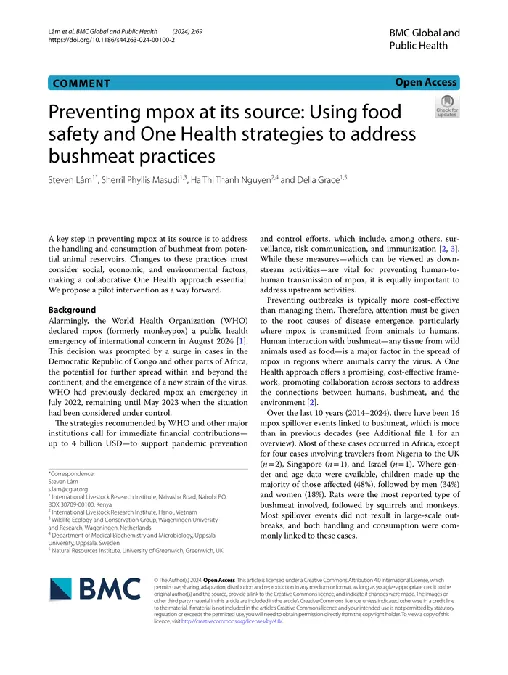
Combatting Mpox: Innovative Strategies to Tackle Bushmeat Practices through Food Safety and One Health
2024-10-10
Author: Arjun
In an alarming turn of events, the World Health Organization (WHO) declared mpox—formerly known as monkeypox—a public health emergency of international concern in August 2024. This declaration follows a disturbing rise in cases in the Democratic Republic of Congo and neighboring African nations, alongside the frightening emergence of a new viral strain. While the WHO had initially classified mpox as an emergency from July 2022 to May 2023, recent developments require renewed attention and robust action.
The urgency for preventative measures is clear, especially as financial contributions of up to $4 billion are being sought to support pandemic prevention initiatives, including crucial efforts in surveillance, risk communication, and immunization. However, these downstream strategies alone will not suffice. Tackling the root causes of disease transmission is vital to curbing future outbreaks.
Understanding the Bushmeat Connection
One of the primary catalysts for the transmission of mpox to humans is the handling and consumption of bushmeat—wild animals used for food—which often serves as a reservoir for the virus. Recent statistics reveal that over the past ten years, 16 confirmed spillover events linked to bushmeat have been identified, predominantly in Africa. Notably, rats, squirrels, and monkeys are among the most frequently implicated species.
Rather than waiting for outbreaks to arise, addressing these upstream practices through a collaborative One Health approach is key. This framework highlights the interconnectedness of human, animal, and environmental health, making it essential for effective interventions.
Learning from Food Safety Initiatives
To mitigate the risks associated with bushmeat, insights from food safety research—particularly within informal markets—can prove invaluable. Informal markets, or "wet" markets, where bushmeat is often sold alongside other fresh foods, tend to operate under minimal regulation, posing significant health risks. The "three-legged stool" method, developed from decades of research by CGIAR, emphasizes building the capacity of local actors, motivating behavior change, and enhancing policy and regulatory frameworks.
1. Capacity Building: Training local communities in adopting safer practices is critical. Effective communication strategies should cater to public perceptions of disease risks while providing practical, protective measures. Engaging trusted community leaders can significantly enhance message acceptance and behavior change.
2. Motivation and Incentives: Traditional reliance on bans has proven to be counterproductive in some regions, leading to underground practices that exacerbate hygiene issues. Instead, focusing on economic, social, and moral incentives can cultivate a stronger motivation for safer practices. Building relationships with local communities and providing economic opportunities can lead to lasting behavioral change.
3. Enabling Policies and Regulations: Policymakers must invest in infrastructure and monitoring initiatives that support food safety, particularly in high-risk environments. Implementing tailored regulations specific to bushmeat can improve hygiene and encourage safer practices. Furthermore, promoting alternative protein sources through sustainable agricultural practices will help lessen dependency on bushmeat.
Implementing the One Health Approach
The One Health framework is integral in addressing the bushmeat issue. Given that bushmeat serves as a vital resource for numerous rural communities in Africa, balancing conservation efforts with public health strategies is paramount. Recognizing the significance of bushmeat in community livelihoods is essential for formulating effective, sustainable interventions.
As countries confront the mpox challenge, it is critical to: - Fully engage local communities in developing responsive strategies to ensure acceptance and participation. - Encourage high-income nations to lead global health initiatives by sharing resources and knowledge to mitigate future outbreaks.
A Call for Pilot Interventions
In light of these findings, we propose a pilot intervention to illustrate the effectiveness of the 'three-legged stool' approach through a One Health collaboration. The intervention can be structured in the following steps: 1. Identify high-risk areas suitable for targeted epidemiological studies and cultural assessments. 2. Launch a proof-of-concept involving community training and sensitization, subsidizing high bushmeat users to adopt alternative livestock and products, and fostering relationships with national policymakers for sustained engagement.
By refining and scaling such interventions, the goal remains clear: to minimize health risks while supporting communities that depend on bushmeat, all while preventing the next potential outbreak of mpox and beyond.
Final Thoughts
The fight against mpox is multifaceted, requiring synergy between health initiatives, community cooperation, and sound policy-making. The future of public health depends on our ability to address these complex connections head-on while promoting sustainable practices that safeguard both human and environmental health.




 Brasil (PT)
Brasil (PT)
 Canada (EN)
Canada (EN)
 Chile (ES)
Chile (ES)
 España (ES)
España (ES)
 France (FR)
France (FR)
 Hong Kong (EN)
Hong Kong (EN)
 Italia (IT)
Italia (IT)
 日本 (JA)
日本 (JA)
 Magyarország (HU)
Magyarország (HU)
 Norge (NO)
Norge (NO)
 Polska (PL)
Polska (PL)
 Schweiz (DE)
Schweiz (DE)
 Singapore (EN)
Singapore (EN)
 Sverige (SV)
Sverige (SV)
 Suomi (FI)
Suomi (FI)
 Türkiye (TR)
Türkiye (TR)